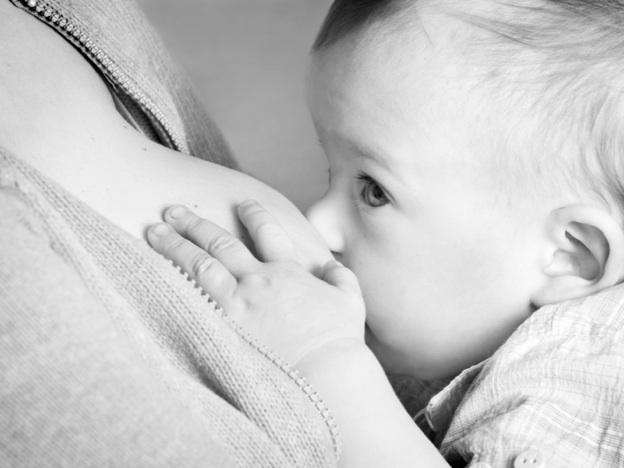SingaporeMotherhood | Pregnancy
May 2012
Breastfeeding Through Pregnancy

Many mothers become pregnant while breastfeeding an older baby. If you are in this scenario, you may face conflicting advice from family and friends about cutting back on breastfeeding or weaning your baby. We clarify some doubts you may have, and suggest ideas to navigate challenges that you may face.
Nutritional Needs
A common concern among pregnant, breastfeeding mothers is whether the nutritional needs of foetus, nursling and mother will be met. There has been no evidence showing that there is any harm to any of the trio when a well-nourished, pregnant mother breastfeeds.
[banner][/banner]
*Foetus
Mothers wonder if the older child’s nursing will ‘take away’ nutrients from the developing fetus. According to Hilary Flower in Adventures In Tandem Nursing, there is no known risk to the unborn baby. This conclusion comes from considering pregnancy-related weight gain, birth weight, and foetal and early infant growth.
*Nursing Child
Breastfeeding older babies, toddlers and preschoolers offers significant immunological and bioactive benefits, even when you are pregnant. However, as pregnancy proceeds, your milk supply usually decreases.
Depending on how much your baby depended on your milk to fulfil his nutritional requirements, you may choose to increase other sources of milk in your baby’s diet. Your child may also increase his intake of solid foods to meet his needs.
*Mother
Mothers who are pregnant and breastfeeding may feel that breastfeeding worsens their pregnancy fatigue. However, fatigue is difficult to measure objectively. Pregnancy, regardless of whether a woman is breastfeeding, may involve fatigue. Breastfeeding your toddler gives you a tool to care for your toddler’s needs, while getting off your feet!
As Liling, mother of three, shares, “Everyone told me that I was so tired because my body was doing two jobs – growing a baby and making milk! But then, breastfeeding gave me a chance to slow down and take the time to be with my older one.”
Breastfeeding through pregnancy does not deplete your nutritional stores or affect your future health. Support your body nutritionally by consuming a balanced, whole foods diet, eating to fullness and staying well-hydrated. It also helps to monitor your pregnancy weight gain.
Emotional Needs
*Your Nursing Child
Nursing is more than delivering food; it is an emotional interaction between mother and child. During periods of illness, hurt, or emotional upset, older babies find comfort and safety in nursing. Nursing an older child through pregnancy creates a constant when there are many changes to come, often easing the transition to having a younger sibling.
*Your Emotions
A mother who is having another baby may face conflicting emotions. She may wonder how she could love another baby as much as her first. Or, nursing may offer her a sense of connection with her older child before baby’s birth.
Says Jeya, mother to two boys, “I became pregnant when my baby was 15 months old. I worried that I wouldn’t be able to give my older one enough time and attention when the new baby came. I felt like I was being unfair to him by having another baby. Breastfeeding him when I was pregnant helped me feel confident that I could meet his as well as the new one’s needs after all!”
Other Considerations
*Food Allergies or Health Problems
If your child is picky about food, allergic to some foods, or has health problems, breastfeeding may offer him more benefits than usual. This adds another dimension to continuing to breastfeed while pregnant.
*Safety
Breastfeeding causes nipple stimulation, triggering oxytocin release and uterine contractions. Couples worry that breastfeeding may then set off miscarriage or preterm labour.
Although mothers may feel these mild contractions while breastfeeding, they do not bring on a miscarriage. The amount of oxytocin released is also insufficient to cause preterm labour. Your pregnant uterus is less sensitive to oxytocin, compared to when your pregnancy is at term.
Challenges
*Sore Nipples & Breastfeeding Agitation
The hormonal changes of early pregnancy often cause nipple soreness when breastfeeding. Some mothers find that the soreness decreases as pregnancy progresses.
Some mothers describe breastfeeding agitation as an irritating physical sensation while breastfeeding; others say it is an intense feeling of aversion towards breastfeeding. Different women experience breastfeeding agitation differently.
You can try:
→ Paying careful attention to your child’s latch when nursing or avoiding positions that are uncomfortable
→ Distracting yourself while nursing
→ Using labour pain techniques
*Breastmilk Changes
Your milk supply may decrease, usually by mid-pregnancy. This is driven by pregnancy and lactation hormones and affects up to 70 per cent of pregnant, nursing mothers.
Your breastmilk also changes in composition, becoming more salty and less sweet. Your nursling may drink more water, decrease his intake in response to the change in taste or he may simply keep nursing with gusto!
→ Some children self-wean when the mother becomes pregnant; it is difficult to tell if these children weaned because of changes in the breastmilk or they were developmentally ready to wean.
→ Dry nursing refers to breastfeeding on an empty breast. Dry nursing sometimes leads to nursing sessions that drag on or a stronger suck, making sore nipples worse.
The psychological and emotional benefits for your child continue, and this may be an option for you.
*Nausea While Breastfeeding
For some mothers, breastfeeding and let-down trigger bouts of nausea; this is likely to be hormone-induced. Other mothers seem to have less morning sickness overall while breastfeeding through pregnancy.
→ Trouble-shoot to see how you can minimise breastfeeding-related nausea.
→ Consider creative solutions relating to your nursing child’s position (moving his body slightly away from your belly to minimise him pressing against your body, for example).
Reaching A Decision
The emotional quality of each breastfeeding session matters; both yours and your nursling’s needs need to be respected. You may want to:
• Reflect on your personal parenting beliefs, your reasons and priorities
• Continue breastfeeding as before
• Limit nursings from an adhoc style to a more predictable pattern
• Consider changing the length or frequency of breastfeeds; you may want to shorten nursing sessions or eliminate the particularly challenging ones
• Decide to approach breastfeeding day-by-day, staying flexible
Choosing to continue breastfeeding, to wean, or anything in between, is a tremendously personal choice. Nursing through pregnancy looks different in every family, depending on the needs of each particular mother-baby pair.
“I wanted to continue breastfeeding but chose to limit nursings for my personal comfort. I felt torn about my decision, but I knew this was the compromise between mine and my daughter’s needs. I felt sad, but I also knew that we were both moving into a new season in our lives as mother and child,” shares Sam, pregnant mother and mother to an almost-weaned two-year-old.
Any changes to the breastfeeding relationship may be particularly difficult for the mother-to-be; journaling, writing a letter to your older child about why nursing has changed, or speaking to other mothers who have breastfed while pregnant may also help.
All content from this article, including images, cannot be reproduced without credits or written permission from SingaporeMotherhood.
Follow us on Facebook, Instagram, and Telegram for the latest article and promotion updates.






